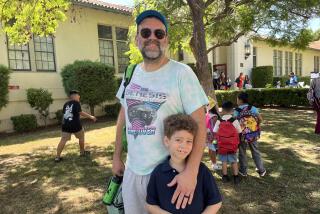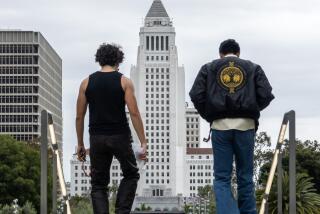A Los Angeles Times Special Report : Coping With The Quake : Recovering From Disaster, Preparing for the Future : Helping Shaken Children Cope : Families: Letting kids talk about their fears and reassuring them of their safety can ease anxiety.
- Share via
Whether or not they slept through an earthquake, children may experience anxiety from it, says psychologist Nancy Hubbell, director of special services for the Laguna Beach Unified School District.
“Typically, if kids feel an earthquake, they may be fearful,” said Hubbell, who has counseled school-age victims of the Laguna Beach firestorms. And if they weren’t aware of it when it was happening, watching television coverage or hearing adults talk about the earthquake can trigger anxiety.
Following a quake, children may become more active or restless or become easily upset or withdrawn. Many children are afraid of sleeping or taking a shower for fear another quake will strike. Some worry about what will happen to them if their homes have been damaged and what has happened to their lost pets.
Parents can help.
Expect children to be clingier, says psychologist Ruth Torres, who counseled elementary school children after the 1989 Whittier earthquake. She suggests that parents try to make children feel safe, and gradually they will get back into old patterns. If their anxieties don’t lessen over time, she suggests parents seek additional help. Sometimes just a few sessions can be helpful.
One important fact for parents to remember is that children are “earthquake prepared” in school, Hubbell said. “So it’s important for (parents) to be every bit as prepared at home. If they aren’t, parents have already set up an anxious situation for their children.”
Go over earthquake preparedness with your children. Reassure them that you have all the supplies you need in your earthquake kit.
Think of the aftermath of a major earthquake as a 36-hour car ride through the desert with your kids, says Dr. Neil Kaufman, head of ambulatory pediatrics at Cedars Sinai. “Parents should have a bag ready with books, age-appropriate toys, cookies and crayons to keep their children’s minds off the fear. Quakes are a very fearful thing to kids.”
More ways to help your children cope with the effects of an earthquake:
* Allow them to talk about it. Avoid the temptation to say, “Don’t worry, everything will be fine.” It’s important that their fears come to the surface and are treated as legitimate. Sending the message that it’s “so bad we can’t talk about it” can make them more afraid.
* It’s important that adults control their emotions in front of children. If parents can handle a quake, kids are likely to handle it too.
* Parents shouldn’t allow children to watch the news after a quake. It is too frightening for them to hear about the “the Big One.”
* Give your children factual information about the earthquake. Explain calmly and matter-of-factly where the event took place and how close it was so your children don’t have a heightened sense of anxiety. Acknowledge that it can be scary, but that you have a plan to cope with it efficiently.
* Children typically have separation anxiety under these circumstances. It’s important to assure them that, should you be separated, you have a plan how to get to them. Remind them that their school has a disaster preparedness plan and they will be safe until you come for them.
* Bedtime can be difficult for children in the aftermath of an earthquake. During these times it is natural for children to want to be close to their parents. It may be possible to rearrange the household sleeping arrangements to accomplish this.
* If going over their fears and giving them reassurance does not assuage you child’s anxiety, professional counseling may be necessary.
* Experts agree that it is helpful for children to participate in post-quake repairs and shopping trips for emergency supplies.
* Maintaining children’s routines as much as possible is another good way to keep children’s minds off earthquakes. “There’s a sense of safety in routine,” Torres says. “A lot of children (who experienced the 1989 Whittier earthquake) said they felt safer at school than at home after the quake.”
School personnel can help pay particular attention to students for whom English is a second language. These students may have more difficulty coping with trauma because they have not gained full information from media reports or family members, Hubbell said.
“Also, some members of the Hispanic community have experienced similar traumas in their homeland before coming here--so it’s especially traumatic for them.”
More to Read
Sign up for Essential California
The most important California stories and recommendations in your inbox every morning.
You may occasionally receive promotional content from the Los Angeles Times.













